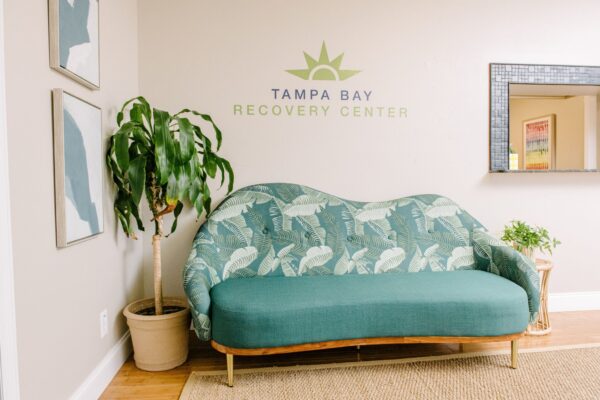Brainspotting Therapy
Brainspotting therapy is a powerful, focused treatment method that works by identifying, processing, and releasing the core neurophysiological sources of pain. Brainspotting is often used to address the trauma associated with addiction. As part of its efforts to treat the whole patient, Gulf Coast Recovery Center offers brainspotting therapy to its clients as part of a comprehensive treatment approach.
What is Brainspotting Therapy?
Developed by Dr. David Grand in 2003, brainspotting (BSP) therapy is an innovative psychotherapeutic approach based largely on modified methods from two other therapies: Somatic Experiencing (SE) and Eye Movement Desensitization and Reprocessing (EMDR).
The concept behind brainspotting is that where we look with our eyes can access and release deep-seated emotions, memories, and neurological patterns. After all, it is driven by the saying, “where you look affects how you feel.”
In a typical brainspotting therapy session, the therapist guides the patient’s eye movement in order to find specific “brainspots,” or eye positions that correspond to the trauma that needs addressing. In other words, brainspots serve as entry points to a patient’s inner world.
The benefits of this therapy include trauma resolution, better emotional regulation, reduced distress, enhanced self-awareness, and improved self-esteem. Brainspotting can be applied as a standalone treatment or be utilized alongside other therapies.

How Does Brainspotting Therapy Work?
Brainspotting therapy is an emerging therapy that focuses on the connection between the brain and the body. Such brain-body therapies are known as “bottom up” therapies, since they aim to release emotional stress that manifests in the body.
Brainspotting works on those parts of the central nervous system responsible for vision, hearing, and motor control. This therapy can, over time, enable the patient to forge new neural pathways so that the “brainspots” triggering feelings of trauma no longer have the power to do so. In this way, the body’s natural healing mechanisms are unlocked and used to resolve psychological trauma and make the patient feel better.
How Can Brainspotting Therapy Help Addiction?
Often, addictive behavior is borne out of some underlying emotional pain or unresolved trauma, as people tend to escape unpleasant thoughts and feelings through the use and abuse of alcohol and other substances. Brainspotting helps people confront and heal the causes of this emotional pain in a targeted manner. In this way, the compulsion to abuse substances as a means of escape disappears.
At the same time, brainspotting therapy helps patients gain insight into their addiction, fostering self-awareness, improving self-esteem, and strengthening the motivations for positive change. Along with other therapeutic approaches, brainspotting can empower individuals to break free from addiction and work toward a more fulfilling lifestyle.
Are You Ready To Change Your Life?
Take Action Now.
What is a Brainspotting Therapy Session Like?
While no two brainspotting sessions are alike, most sessions follow a general protocol.
First, the patient will engage in some relaxing breathing techniques, possibly while listening to bilateral music through headphones. Once they have entered a relaxed, mindful state, the patient will identify a place on or in their body where they feel distress.
With the therapist’s help, they will then discover “brain spot,” that is, a spot in the room where their eyes naturally focus when the distress feels the most intense. The patient will be guided to focus on this point by the therapist.
The therapist may then take one of two approaches: the Outside Window approach or the Inside Window approach. In the Outside Window approach, the therapist observes the patient’s gaze and recommends a specific point on which to focus. In in the “Inside Window” approach, the patient identifies the point to process.
From there, both patient and therapist focus on and explain the feelings that the patient is experiencing. Then, time is taken for both parties to process the experience of what came up and what it might mean.
Many patients report feeling a sense of mental or physical release at the end of a session. Fatigue is also a natural side effect of a successful session.
Benefits of Brainspotting Therapy
Brainspotting offers many benefits for those living with trauma and other mental health disorders, providing a pathway to healing and mental well-being. The following are some of the key benefits of the therapy:
- Trauma resolution. Brainspotting therapy allows patients to process and release trauma in a safe and controlled environment. This leads to reduced distress and improved mental health.
- A holistic approach. Brainspotting is a therapy that acknowledges the mind-body connection. In fact, many patients living with chronic pain or tension have benefited from this therapy.
- Targeted healing. Unlike some traditional “talk” therapies, brainspotting targets specific areas of distress. This helps patients access and process unresolved emotions and memories.
- Minimal verbalization. Brainspotting doesn’t require extensive verbalization, which relieves patients from having to express their feelings and experiences with words. The benefits of this therapy, therefore, can be felt particularly by children and non-native speakers.
- Customization. Therapists can tailor brainspotting sessions to each patient’s unique needs, ensuring an individualized treatment approach.
- Fast results. Some patients report noticeable improvements in a relatively brief period, which can be hugely beneficial for those seeking immediate relief from acute distress or severe emotional pain.

Other Conditions That Brainspotting Treats
Lots of disruptive thoughts and behaviors have trauma at their root. In addition to substance use disorder, brainspotting therapy may be beneficial in treating the following mental health disorders:
- Post-traumatic stress disorder (PTSD)
- Depression
- Anxiety
- Attention deficit hyperactivity disorder (ADHD)
- Anger
- Persistent fatigue
- Impulsive behavior disorders
- Chronic pain

Medically Reviewed
Medically Reviewed by
Jennifer Strong, LMHC
Written by Gulf Coast Recovery Staff Updated on January 12, 2024
Get Help Now
Rehab in Tampa, FL
Mental health disorders and addiction can severely impact your quality of life. But there is hope for recovery. Call Gulf Coast Recovery today to begin treatment with us.
Facility Image Gallery
Begin Brainspotting Therapy in Tampa Today
Addiction and mental health disorders can often occur simultaneously, with one contributing to the other and vice versa. If you’re living with a substance use disorder, you may benefit from such mental health treatments as brainspotting therapy. At Gulf Coast Recovery Center, we offer comprehensive treatment designed to heal the whole individual. Contact us today to learn more about our programs.









 They recognized me as an individual. This is not a place that has cookie-cutter treatments that they attempt to force every patient to fit into. They realize that different people with similar problems respond differently, some better to one type of treatment and some not so much. I feel like that is why I succeeded here.
They recognized me as an individual. This is not a place that has cookie-cutter treatments that they attempt to force every patient to fit into. They realize that different people with similar problems respond differently, some better to one type of treatment and some not so much. I feel like that is why I succeeded here.



